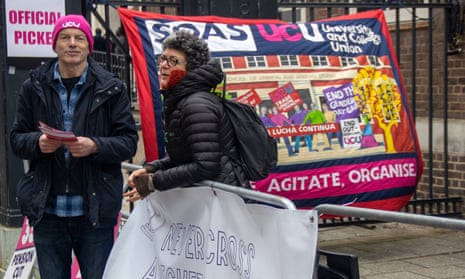Universities in the UK have been hit by strike action once again, despite hopes of a breakthrough last week with an offer from employers on pay, working conditions and pensions.
Tens of thousands of staff at 150 universities pressed ahead with planned strikes on Monday in the first of three days of industrial action this week, with many branches claiming big turnouts on picket lines.
Members of the University and College Union (UCU) are also being reballoted on their long-running dispute, which – without a resolution – could lead to disruption continuing for the rest of the academic year.
Last week, there appeared to be signs of progress after university employers put forward a set of proposals on pay, conditions and pensions, which was described by the union as a “breakthrough”.
The UCU said the offer would “pave the way for the Universities Superannuation Scheme (USS) pension to be restored by April 2024, to end the use of involuntary zero-hours contracts in higher education, and to agree new standards, frameworks and principles to tackle other forms of casualised contracts, reduce workloads and close equality pay gaps”.
The earlier pay offer of the Universities and Colleges Employers Association (UCEA) of at least 5%, rising to 8% with a proportion paid in advance, was unchanged.
after newsletter promotion
Commenting on Wednesday’s developments, the UCU general secretary, Jo Grady, said: “This breakthrough is down to the strength, determination and sacrifice of university workers who have stood on picket lines. The proposals will now move through our union’s democratic processes, and strike action will continue until our 70,000 UCU members have had the chance to have their say.”
Grady subsequently said 36,000 members took part in an e-ballot on the new proposals, of which more than two-thirds were in favour of a vote on the proposals and a pause in strikes to do so. A branch delegates’ meeting marginally supported putting the proposals out to a members’ ballot but voted to continue action.
The UCU’s higher education committee, which has the authority to decide what happens next, voted, however, to continue the industrial action and decided against putting the proposals out for members to vote on.
Raj Jethwa, UCEA’s chief executive, said: “Every indication is that UCU members are tired of strike action. That is why students and staff across the UK’s higher education sector will be deeply disappointed that UCU’s higher education committee has decided to proceed with [this] week’s attempted strike action.”
Meanwhile, intensive negotiations between the government and teaching unions in England over teachers’ pay after a damaging series of strikes have continued. The talks between union leaders and Gillian Keegan, the education secretary, began on Friday and went on over the weekend.







